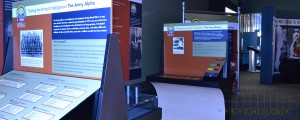Using field trips to promote critical thinking
Many thanks to Dr. Jodi Kearns, Digital Projects Manager at the Cummings Center for the History of Psychology for this guest post. The Cummings Center has been a Smithsonian Affiliate since 2002 and is located at the University of Akron in Akron, Ohio.

The Cummings Center for the History of Psychology houses exhibition galleries and extensive archives at its site in Akron.
The mission of the Cummings Center for the History of Psychology (CCHP) is to promote the history of psychology and related human sciences to the broadest community possible. Integral to this mission is offering structured educational opportunities to empower critical thinking about primary source materials held in the CCHP archives. As such, CCHP staff set a goal to make field trips both effortless for local high school teachers and useful to their students in order to encourage teachers from any subject area to bring their classes to the CCHP Museum of Psychology, which exhibits artifacts and documents from the CCHP archives. Organized, well-planned field trips to museums and archives as structured, free-choice learning environments can foster learning experiences that are self-directed and hands-on (Kisiel, 2006). To gain a better understanding of teachers’ perspectives, CCHP staff sent a survey to all high school teachers in the Akron Public Schools in Akron, Ohio during Spring 2012. Results indicated that all of the responding teachers rated field trips as moderately to very important for student learning. When asked to rate the potential helpfulness of various field trip resources for teachers, they rated all the proposed resources–pre- and post-trip activities, onsite activities, learning objectives mapped to curriculum standards, and teacher’s guides to the exhibits–as very helpful.
In response to the local educational community’s need for focused field trips identified in the survey, CCHP staff held a free workshop in Fall 2013 for teachers interested in providing more in-depth perspectives of field trips and moderating CCHP staff lesson plan building. This collaborative partnership has resulted in robust three-part lesson plans adaptable to all high school grade levels and mapped to state and core academic content standards in mathematics, science, social studies, and language arts. Each lesson plan suggests activities and materials in which teachers can engage students before, during, and after the field trip. Upon lesson completion, students will have had hands-on engagement with archival materials spanning CCHP collections, including artifacts, photographs, films, rare books, and historical tests. The lesson plans are part of the complete Teachers Resource Package that also includes gallery maps, behavioral guidelines for visits within archives and museums, guides to gallery content, and chaperone guides with instructions for facilitating on-site dialogue around the student-guided gallery guides. Further, archival materials not on display in the public gallery have been placed in the CCHP’s online repository (OCLC’s CONTENTdm) where teachers can access supporting materials from their classrooms for before and after activities.
This project is funded by the Institute of Museum and Library Services (IMLS) Museums for America grant, which enabled the installation of a new interactive museum exhibit called Measuring the Mind to capture interest of high school (and other) visitors. Measuring the Mind features artifacts, tests, photographs, and film from CCHP collections and takes museum visitors through some history of testing aptitude, personality, intelligence, and interest.
If you would like to learn more about how to incorporate materials from the history of psychology into your lesson plans or professional development for teachers, or if you know a teacher who might be interested in using our resources, please contact ahap@uakron.edu for more information.
Kisiel, J. (2006). An examination of fieldtrip strategies and their implementation within a natural history museum. Science Education, 90 (3), 434-452.







